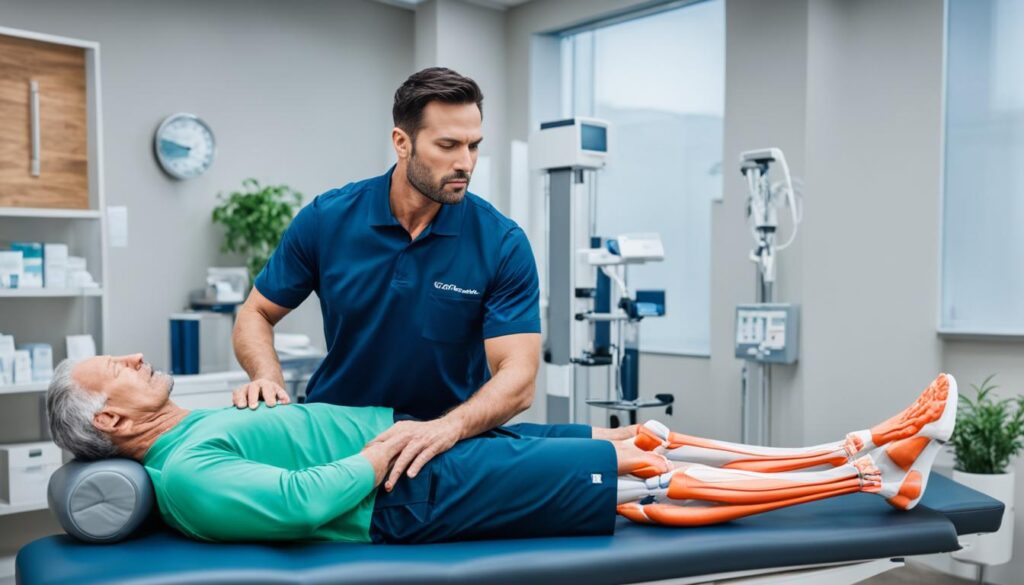Leg cramps can be caused by various factors, including certain medications. It is important to be aware of the potential side effects of the medications you are taking to understand if they could be contributing to your leg cramps. In this article, I will explore some common medications that are known to cause leg cramps and discuss what you can do if you experience this side effect.
Key Takeaways
- Leg cramps can be a side effect of certain medications.
- Common medications that can cause leg cramps include antipsychotics, diuretics, beta-blockers, beta2-agonists, and ACE inhibitors.
- Other potential causes of leg cramps include thyroid issues, varicose veins, vascular disease, cirrhosis, kidney failure, alcohol abuse, type 2 diabetes, stress, low circulation, and excessive or inadequate exercise.
- Identifying whether a medication is causing leg cramps may require assistance from a healthcare professional.
- BASS Vein Center offers vascular services and can provide assistance and information for individuals experiencing leg cramps caused by medication.
Medications that can cause leg cramps
There are several medications that can potentially cause leg cramps as a side effect. These medications include:
- Antipsychotics
- Short-acting loop diuretics
- Thiazide diuretics
- Beta-blockers
- Beta2-agonists
- ACE inhibitors
The mechanism through which these medications cause leg cramps varies. It is believed to be related to their effects on the central nervous system, electrolyte levels, and blood flow to the limbs.
If you are taking any of these medications and experiencing leg cramps, it is important to consult with your doctor for further evaluation and management.
Other Potential Causes of Leg Cramps
While medications can be a common cause of leg cramps, there are also other potential causes to consider. These include:
- Thyroid issues
- Varicose veins
- Vascular disease
- Cirrhosis
- Kidney failure
- Alcohol abuse
- Type 2 diabetes
- Stress
- Low circulation
- Excessive or inadequate exercise
If your leg cramps persist or worsen, it is recommended to speak with your doctor to determine if there is an underlying medical condition contributing to your symptoms.

Common Medical Conditions Associated with Leg Cramps
| Medical Condition | Main Characteristics |
|---|---|
| Thyroid issues | Abnormal activity of the thyroid gland, affecting hormone production |
| Varicose veins | Enlarged, twisted veins near the surface of the skin, usually in the legs |
| Vascular disease | Conditions that affect blood circulation and blood vessels |
| Cirrhosis | Scarring of the liver due to long-term liver damage |
| Kidney failure | Inability of the kidneys to properly filter waste from the blood |
| Alcohol abuse | Excessive and prolonged consumption of alcohol, leading to various health issues |
| Type 2 diabetes | Chronic condition that affects the way the body metabolizes glucose |
| Stress | Physical or emotional tension that can contribute to muscle cramps |
| Low circulation | Poor blood flow to the legs and feet, often caused by conditions such as peripheral artery disease |
| Excessive or inadequate exercise | Overexertion or lack of physical activity can both contribute to leg cramps |
Identifying the underlying cause of leg cramps is essential for proper treatment and management. If you are experiencing persistent leg cramps, consult with your doctor for a thorough evaluation and guidance.
How to Know if Medication is Causing Leg Cramps
Identifying whether a medication is causing your leg cramps can be challenging and may require assistance from a healthcare professional. There are several steps you can take to determine if your medication is the likely cause of your leg cramps.
Step 1: Keep a Symptom Journal
Start by keeping a detailed record of your leg cramps. Note the frequency, intensity, duration, and any other associated symptoms or triggers. This will help you track patterns and identify any potential correlations with your medication.
Step 2: Check the Medication’s Side Effects
Consult the package insert or information leaflet that comes with your medication. Look for leg cramps listed as a known side effect. If leg cramps are mentioned, it increases the likelihood that your medication could be the cause.
Step 3: Consider the Timing
Think about when your leg cramps started in relation to when you began taking the medication. If the leg cramps coincided with the introduction of the medication or a dosage change, it could indicate a possible connection.
Step 4: Consult with Your Healthcare Provider
Make an appointment with your healthcare provider to discuss your leg cramps and the possibility of medication-related side effects. Provide them with your symptom journal and any other relevant information. They will be able to evaluate your specific situation and recommend appropriate next steps.
Your healthcare provider may suggest medication adjustment, further testing, or monitoring to assess the impact of the medication on your leg cramps. With their guidance, you can effectively manage and address this side effect. Remember, never make changes to your medication regimen without proper medical supervision.
By actively participating in the diagnosis process, you can gain a clearer understanding of whether your medication is causing your leg cramps. This is an essential step towards finding relief and improving your overall well-being.
BASS Vein Center Can Help
If you are experiencing uncomfortable leg cramps as a side effect of your medication, it is important to discuss this with your doctor. BASS Vein Center can provide assistance and information to individuals experiencing leg cramps caused by medication. Contact BASS Vein Center at (925) 281-5912 for further assistance.

Leg cramps caused by medication can be a distressing symptom. At BASS Vein Center, we understand the impact leg cramps can have on your daily life. Our experienced team specializes in providing comprehensive vascular services to help you find relief from leg cramps. Whether it’s through non-invasive treatments or lifestyle modifications, we can tailor a leg cramp treatment plan that suits your individual needs.
“At BASS Vein Center, we are committed to helping individuals experiencing leg cramps caused by medication. Our team of experts will work closely with you to diagnose the underlying cause of your leg cramps and develop a personalized treatment plan. With our state-of-the-art facilities and advanced techniques, we aim to provide effective and long-lasting relief from leg cramps.”
BASS Vein Center Services:
- Vascular consultation and evaluation
- Diagnostic testing
- Treatment options tailored to your specific needs
- Education and guidance on managing leg cramps
- Follow-up care and monitoring
At BASS Vein Center, we believe in a holistic approach to leg cramp treatment, addressing the underlying cause while focusing on improving your overall well-being. With our expertise and specialized care, you can take the first step towards finding relief from leg cramps caused by medication.
| Treatment Options | Description |
|---|---|
| Medication adjustment | Working with your healthcare provider to modify medication dosage or switch to alternative medications that are less likely to cause leg cramps. |
| Physical therapy | Exercises and stretches that target the affected muscles to improve flexibility and reduce the frequency and severity of leg cramps. |
| Compression therapy | Wearing compression stockings or socks that promote healthy blood flow and reduce the occurrence of leg cramps. |
| Lifestyle modifications | Adopting healthy habits such as proper hydration, balanced diet, regular exercise, and stress management to alleviate leg cramps. |
| Minimally invasive procedures | In some cases, procedures such as sclerotherapy or endovenous ablation may be recommended to treat underlying vein conditions contributing to leg cramps. |
Remember, it is important to consult with your healthcare provider before making any changes to your medication or treatment plan. BASS Vein Center is here to support you on your journey to finding relief from leg cramps caused by medication.
Clinical Features and Diagnostic Evaluation of Leg Cramps
Leg cramps are characterized by painful, involuntary muscle contractions that can last several minutes. They often occur during the night and may be accompanied by secondary insomnia. While the diagnosis of leg cramps primarily relies on the patient’s history, additional diagnostic tests may be necessary to confirm specific underlying conditions.
Symptoms of Leg Cramps
The most common symptom of leg cramps is the sudden onset of intense pain in the muscles, usually in the calf area. The affected muscles may feel hard and knotted during the cramp. The cramp can last for a few seconds to several minutes, causing significant discomfort and limitations in movement.
Common symptoms of leg cramps include:
- Sharp, stabbing pain in the leg muscles
- Twitching or spasms in the muscles
- Tightness or hardness in the affected muscles
Diagnostic Evaluation
The diagnostic evaluation of leg cramps primarily involves a thorough patient history and physical examination. Your healthcare provider will ask about the duration, frequency, and nature of your leg cramps to gather important information for the diagnosis. They may also inquire about any underlying medical conditions or medications you are taking that could contribute to the cramps.
In some cases, additional diagnostic tests may be ordered to rule out underlying medical conditions or confirm specific causes of leg cramps. These tests may include:
- Blood tests to check for electrolyte imbalances, kidney function, or signs of hormonal abnormalities
- Nerve conduction studies to evaluate nerve function and detect potential nerve damage
- Doppler ultrasound to assess blood flow and identify any vascular abnormalities
- Imaging tests, such as X-rays or magnetic resonance imaging (MRI), to exclude structural causes like herniated discs or nerve compression
Overall, the diagnostic evaluation for leg cramps focuses on gathering detailed information about the symptoms, conducting a thorough physical examination, and considering additional tests as needed to identify any underlying medical conditions or triggers that may be contributing to the leg cramps.
| Diagnostic Tests for Leg Cramps | Indications |
|---|---|
| Blood tests | To check for electrolyte imbalances, kidney function, and hormonal abnormalities |
| Nerve conduction studies | To evaluate nerve function and detect potential nerve damage |
| Doppler ultrasound | To assess blood flow and identify vascular abnormalities |
| Imaging tests (X-rays, MRI) | To exclude structural causes like herniated discs or nerve compression |
Conclusion
In summary, leg cramps can be a side effect of certain medications, but they can also have other causes. It is important to be aware of the potential side effects of the medications you are taking and consult with your healthcare provider if you experience leg cramps. BASS Vein Center is available to provide assistance and information to individuals who are dealing with leg cramps caused by their medication.
When experiencing leg cramps, it is essential to keep track of your symptoms and check the side effects listed for your medications. If you suspect that your leg cramps are being caused by your medication, it is important to seek appropriate medical evaluation. Your healthcare provider can help determine the underlying cause of your leg cramps and recommend the necessary treatment or adjustments to your medication.
Remember, understanding the relationship between your medication and leg cramps is crucial for managing this uncomfortable side effect effectively. Whether the leg cramps are a result of medication side effects or other causes, BASS Vein Center and your healthcare provider are there to support you in finding relief from leg cramps and ensuring your overall well-being.
FAQ
Can leg cramps be a side effect of medication?
Yes, certain medications can cause leg cramps as a side effect.
What are some medications that can cause leg cramps?
Some medications known to cause leg cramps include antipsychotics, short-acting loop diuretics, thiazide diuretics, beta-blockers, beta2-agonists, and ACE inhibitors.
What are other potential causes of leg cramps?
Other potential causes of leg cramps include thyroid issues, varicose veins, vascular disease, cirrhosis, kidney failure, alcohol abuse, type 2 diabetes, stress, low circulation, and excessive or inadequate exercise.
How can I determine if my medication is causing my leg cramps?
It may be challenging to identify if a medication is causing leg cramps. Keeping a symptom journal, checking medication side effects, considering the timing of when the leg cramps started, and consulting with your healthcare provider are important steps in determining the cause.
Can BASS Vein Center help with leg cramps caused by medication?
BASS Vein Center offers vascular services and can provide assistance and information to individuals experiencing leg cramps caused by medication. Contact BASS Vein Center at (925) 281-5912 for further assistance.
What are the clinical features and diagnostic evaluation of leg cramps?
Leg cramps typically present as painful, involuntary muscle contractions. The diagnosis is usually based on patient history and physical examination findings, with selected blood tests or other diagnostic studies ordered if needed.
What should I do if I have leg cramps as a side effect of medication?
It is important to consult with your healthcare provider for further evaluation and management of your leg cramps.
Should I be concerned if I experience leg cramps from medication?
While leg cramps can be a side effect of medication, it is always recommended to consult with your healthcare provider to ensure there are no underlying medical conditions contributing to your symptoms.
Can leg cramps from medication be managed or resolved?
Depending on the underlying cause, medication adjustment, testing, or monitoring may be recommended by your healthcare provider to manage or resolve leg cramps caused by medication.





